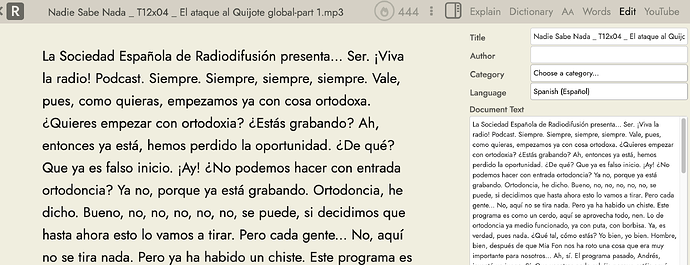The main objection is that every extra option increases the complexity so I like to get a sense that any new option I add will benefit a decent number of users, and I don’t think I’ve had anyone else request this. Also, I think it’s beneficial to practice recalling in both directions.
I lay awake last night thinking about your concern vs. my concern. First of all, I’m not suggesting getting rid of “recalling in both directions”. I’ve done well with the current system in order to develop quick sight recognition. I’m talking about adding a choice, to strengthen listening, not taking anything away.
I thought Readaloud improvement sugesstion was a great idea because it increased auditory and speaking support. My request is another way to increase auditory and speaking support.
If your end goal is actually reading for the sake of reading, or even reading for the sake of reading+writing (primarily academic), then it probably seems my stress on listening is misplaced. Also, you’ve commented on your strong visual memory. For all I know, you may already be fluent in multiple languages (I have a nephew who has perfect pitch and a near photographic memory, who taught himself, by age 23, to speak fluently – without an accent – in Spanish, Japanese, and enough Mandarin that he could overhear students from China plotting how to cheat on an upcoming computer engineering exam).
In contrast, I rely on reading plus formal mnemonics training to learn pretty much everything. Without those two tools, I would probably be considered low IQ/ uneducable (and that was probably substantially correct before age 12) by the formal school system. Instead, I’ve earned multiple advanced technical degrees. With those tools, plus readlang, I’ve made substantial progress in learning Spanish. I can now read Spanish well enough that my end goal of being able to travel freely across S. America is coming into sight. I just need to improve my listening and speaking. Your adding audio support and, then, Blitz really removed major bottlenecks for me.
Based upon what I’ve heard and read, repeatedly, most people who set out to become fluent in a second language never get there. Most of them, in my experience, never get to first base – they take 2 years or more of a language and then forget it. There is a subset which can read okay, but can’t understand spoken language very well, and generally can’t speak much beyond “Dónde el baño.” Reading doesn’t lead inexorably to hearing, and certainly not to speaking. For that, I think the evidence is clear, one needs to focus more on hearing and speaking. Most people hire, or make other arrangements, for a private tutor at this point.
If I may be so immodest, I may be one of your better examples of how great readlang is, and how it can revolutionize second language acquisition. I have no natural talent for language learning; I’m almost 70, and traditional methods of language acquisition haven’t worked well for me. I try to be strategic/flexible, which is why I switched to readlang when traditional routes weren’t working. I am extremely motivated to become fluent, in order to adapt to S. America. And I like to give constructive feedback when there is an endeavor I believe in.
My guess (you could poll) is that most of your users, and certainly most language learners, are doing it for practical reasons. Most of these, I expect, really want the ability to hear and speak at a native level. Getting to the point when they can read comfortably is a helpful and encouraging outcome, but it isn’t the end goal. And children, of course, acquire their languages ONLY by listening and feedback from tortured speaking.
Adding the audible sentence loop within the main reading module is going to be a huge advance in readlang as a learning platform for people who are using reading as a strategy toward hearing-speaking. I’m looking forward to trying it. That is why I advocated for it, strongly, in that thread: I didn’t want you to think it was only a need for one user.
I’m really just advocating for bringing something equivalent to the Blitz feature. I want to be able to repeatedly listen, to repeatedly speak aloud, and I want to focus on the phrases which are causing me the most difficulty, which are tongue twisters, or which are highly idiomatic (reusable patterns). For that, Blitz is a better forum than practicing within the context of normal reading of a book.
And, again, I wouldn’t keep bringing it up if I wasn’t convinced (1) it should be very easy to do (2) it adds something important beyond the current “both ways” (3) it would better train a much needed skill – whether or not other people realize it just yet (4) it is a strategic breakthrough which, together with that sentence loop feature, takes readlang to a whole new level – whether or not other people yet realize that.
So I hope you put your concerns aside on this one, trust me a little bit, and just go a few more inches to cross the finish line adding choice. I need it. Other people need it too, whether or not they realize that … yet.

